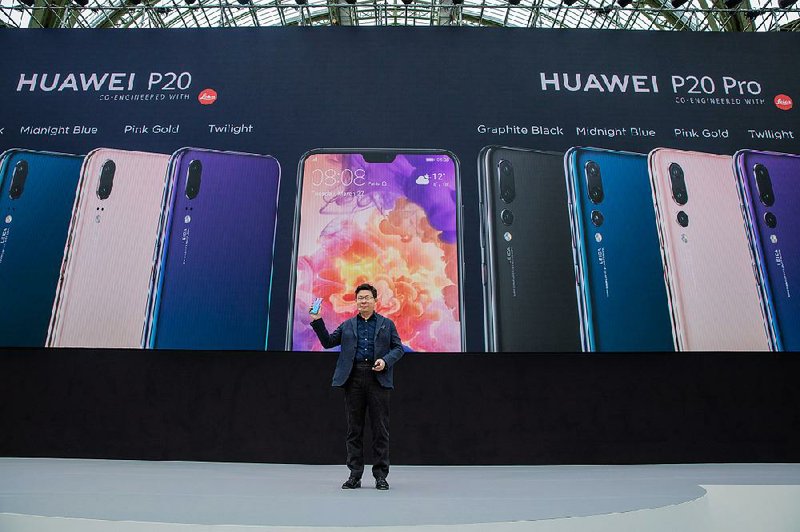BEIJING -- China appealed to Washington on Thursday to avoid damaging business confidence after a report that U.S. authorities are investigating whether Chinese tech giant Huawei violated sanctions on Iran as technology tensions spiral.
The Wall Street Journal's report came ahead of a trip to Beijing by U.S. Treasury Steve Mnuchin and U.S. Trade Representative Robert Lighthizer next week to discuss President Donald Trump's threat to raise tariffs on Chinese goods in a dispute over technology policy.
Last week, Washington barred Huawei rival ZTE Corp. from exporting U.S. technology in a separate case over exports to Iran and North Korea.
A Foreign Ministry spokesman, Hua Chunying, said China opposes any country imposing unilateral sanctions based on its own law.
Asked about the report that Huawei was under investigation, Hua said, "We hope the U.S. will refrain from taking actions that could further undermine investor confidence in the U.S. business environment and harm its domestic economy and normal, open, transparent and win-win international trade."
The Journal said it was unclear what Huawei might be suspected of. It gave no other details.
Huawei, the world's biggest maker of network switching gear used by phone and Internet companies, declined to comment on the Journal report.
In a written statement, the company said, "Huawei complies with all applicable laws and regulations where it operates, including the applicable export control and sanction laws and regulations of U.N., U.S. and EU."
Last week's penalty against ZTE stemmed from a U.S. complaint that the company promised to discipline employees who were involved in a scheme to violate restrictions on exports of American technology to Iran and North Korea and instead paid them bonuses.
ZTE said the seven-year ban might jeopardize the company's survival.
On Wednesday, Huawei dropped a planned dollar-denominated bond sale and delayed pricing a European offering.
The U.S. Commerce Department in 2016 issued an administrative subpoena aimed at Huawei seeking information about whether it was sending U.S. technology to rogue nations including Syria, Iran and North Korea.
Separately, the Federal Communications Commission voted unanimously last week to ban federal funds from being used to purchase networking gear from companies determined to be a national security risk, dealing another blow to ZTE and Huawei. The measure has yet to be finalized. FCC Chairman Ajit Pai cited the risk of "hidden 'back doors' to our networks in routers, switches and other equipment" that could "allow hostile foreign powers to inject viruses and other malware."
Trump has threatened to raise tariffs on up to $150 billion of Chinese goods in response to complaints Beijing improperly pressures foreign companies to hand over technology.
That is widely seen as part of a broader effort by Washington to respond to intensifying competition with Chinese technology industries that Trump says benefit from improper subsidies and market barriers.
Announcing Mnuchin's Beijing trip, Trump said the tariff plan would go ahead unless a "trade deal" is reached, though he gave no details of what Washington wants. Mnuchin met last week with finance officials from China, Japan and Europe.
Elaine Chao, the U.S. secretary for transportation, was in Beijing this week for meetings focused on safety and infrastructure.
At an event with Chao on Thursday, Chinese Premier Li Keqiang called for both sides to seek steady and sound growth in relations between Washington and Beijing.
"It is what the people around the world expect from our two countries, and why our two countries need to work together in the spirit of mutual respect, equal-footed consultation, to increase consensus and reduce differences," Li said.
President Xi Jinping promised this month to open China's markets wider to foreign companies but didn't directly address U.S. and European complaints about technology policy.
Huawei has faced several setbacks in the U.S. this year. AT&T Inc. and Verizon Communications Inc., the biggest U.S. carriers, dropped plans to sell Huawei's latest smartphones. Then, consumer electronics retailer Best Buy Co. stopped selling Huawei phones, laptops and smartwatches.
Huawei maintains research and development facilities in Texas, New Jersey, California and four other U.S. states, all of which provide technology for its global operations.
"While the U.S.-China trade frictions could escalate, causing major economic impact, we think it is more likely that tariff imposition will be contained," Louis Kuijs of Oxford Economics said in a report. "But broader economic tension and rivalry between the two is on the rise, with serious long-term implications, especially in the area of technology."
Meanwhile in Shanghai, executives of the Walt Disney Co. stressed their deep China connections as the company opened an extension of its $5.5 billion Disney Resort in the city.
Many U.S. companies bear a significant political risk in China, where in the past political tensions have prompted protests and boycotts of South Korea, Japanese and U.S. businesses. At the colorful, confetti-laced launch of the new Toy Story Land extension, Disney representatives emphasized the large degree of collaboration with the company's local, state-owned partner.
"I want to thank the people of China for wholeheartedly embracing this resort, for truly making it your own," said Disney chief executive Robert Iger.
Information for this article was contributed by Erika Kinetz of The Associated Press and by Sheridan Prasso of Bloomberg News.
Business on 04/27/2018
